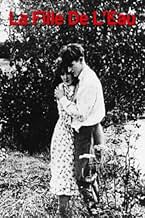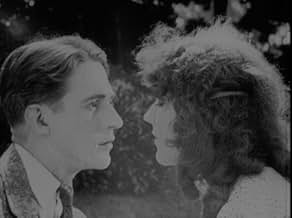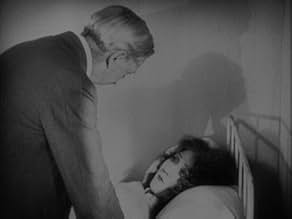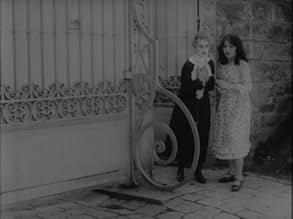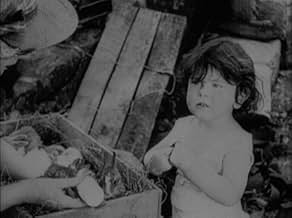After her father's death and her uncle having drunk all the inheritance, Virginia is left alone. She is accepted by a family of bohemians but a quarrel between the bohemians and the peasants... Read allAfter her father's death and her uncle having drunk all the inheritance, Virginia is left alone. She is accepted by a family of bohemians but a quarrel between the bohemians and the peasants coerce her to flee the peasants' riot. She is then helped by Raynal who falls in love wit... Read allAfter her father's death and her uncle having drunk all the inheritance, Virginia is left alone. She is accepted by a family of bohemians but a quarrel between the bohemians and the peasants coerce her to flee the peasants' riot. She is then helped by Raynal who falls in love with her but is too shy to tell her. Sheltered by his father, Virginia is robbed by her uncle... Read all
- Director
- Writer
- All cast & crew
- Production, box office & more at IMDbPro
Featured reviews
The heroine called Gudule (the name has become completely ludicrous in today's France ;no one is called Gudule anymore)is played by Renoir's favorite actress of the silent era ,Catherine Hessling.Her fate is worthy of Hugo's "les miserables" :mistreated by a wicked lecherous uncle ,taken in by a poacher and his mum, left in the cold and the rain...And finally she finds love :a nice young man falls for her and marries her.His background is very bourgeois ,but the parents do not seem to bother.That is to say we are far from "Boudu Sauvé des Eaux" ,"La Chienne" and even "Une Partie de Campagne" .
Best moment: the heroine's nightmare;people who know well Renoir's silent era will notice the similarities between this sequence and that of "La Petite Fille aux Allumettes" where the little match girl and her attentive escort go for a horse ride in the sky.The comparison stops here for " La Fille de l'Eau' is inferior to the Andersen adaptation.
Actually the main influence is DW Griffith but then again Hessling is not
Lilian Gish.
For Renoir's fans.The others might find it a bit obsolete.
But there is a dream sequence here that, as so often with these silent dreams, I urge you to see. It's about the girl transmuting in her feverish mind these barely comprehensible forces that threaten the virgin soul into images that will make sense; so an imaginative flight, a sensual, delirius game of hide-and-seek where the coarse, violent men haunt her down, where a piece of rope transforms into the snake of mischievous desire, a point-of-view rushing towards a door and the light outside, and finally the man who can protect her shown, quite literally, as a champion on his white horse galloping across the skies.
The overwhelming experience is so perfectly about the distorted imprint of the world. This should be seen next to the best moments in Epstein. There is shadow here cast by the eye in motion, emotional or otherwise.
Another note that intrigues, a blemish in the perfect picture of her well-to-do benefactor. His parents are shown at one point hastily leaving for Algiers on account of business; what was probably meant innocently at the time, now can only leave us wondering at his source of wealth.
The story gives the impression of having been cut down from a sprawling melodrama and crammed into too small a space, with highly-coloured events occurring in implausible and ultimately tedious sequence: the film is only about seven reels, but felt considerably longer to sit through by the end. There is no character development to speak of, the various individuals concerned being one-dimensional cardboard figures who pop in and out of the plot as convenient, and the leading lady is neither convincing as an adolescent nor, apparently, much of an actress. The male roles are fairly well-played within the limitations and stereotyping of the script, but Catherine Hessling all too often gives the impression of simply striking poses and painting on expressions to order.
The dislocated and arbitrary nature of the calamities that befall her verges at times on the bathetic, since practically no prefiguring takes place. If a man falls overboard, or a quarry opens up suddenly underneath her, or a family abruptly up sticks and move abroad lock, stock and barrel, then it is purely for the convenience of the plot. As others have commented, the most memorable sequence is that of the nightmare where she finds herself surreally beset by villains from earlier episodes; this experimentation was presumably where the director's heart lay. A little of this, however, goes a long way.
All in all, the film isn't even bad enough to be good. An actress of Mary Pickford's calibre might perhaps have pulled some successful emotional impact out of the twopenny plot, but failing any particular interest or sympathy for the central character (it's hard not to share La Fouine's impatience as she proves such a shrinking liability in her first poaching lesson) I felt this picture had little to offer. It tries for low humour; it tries for high drama; it tries for romance. It doesn't achieve a terribly impressive level in any of them.
Although the story is clearly indebted to Griffith, the visuals are Renoir's own. WHIRLPOOL contains scenes that would be recast in later movies such as F. W. Murnau's SUNRISE (1927) and Jean Vigo's L'ATALANTE (1934). The highlight is a dream sequence which is worthy of Hitchcock. Hessling, wearing stark monochromatic make-up, gives a respectable silent film performance as the hapless orphan who goes from one mishap to another. The male performers acquit themselves well in what are essentially one-dimensional characters who are strictly plot motivated.
This new Kino Lorber Blu-Ray is a nice upgrade from the old 2007 Lionsgate DVD release. The picture has undergone a 4K restoration effort which helps to clear up some of the contrast issues especially in the night scenes and gives a sharper image throughout. The original concertina score by Marc Perrone has been replaced with one by Antonio Coppola. It is more user friendly in that it offers more variety but I prefer the original which enhances the bleakness of the story. The Blu-Ray comes with an audio commentary by critic Nick Pinkerton that provides background on Renoir and the film...For more reviews visit The Capsule Critic.
Did you know
- TriviaCharlotte Clasis's debut.
- ConnectionsEdited into Spisok korabley (2008)
Details
- Runtime
- 1h 11m(71 min)
- Color
- Sound mix
- Aspect ratio
- 1.33 : 1


